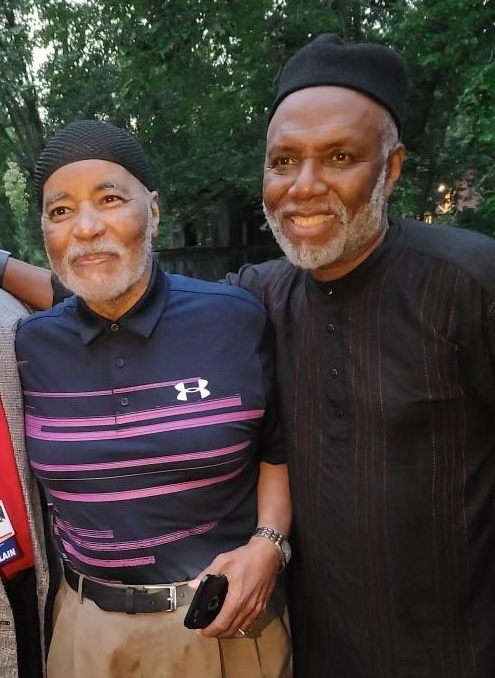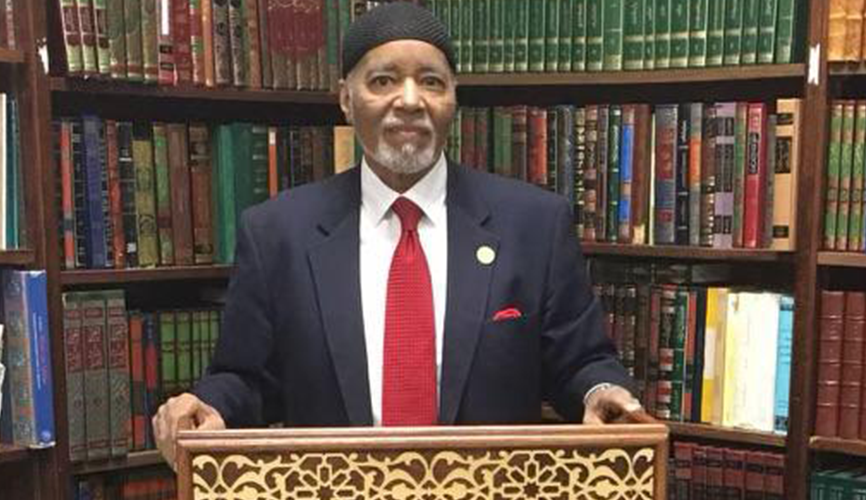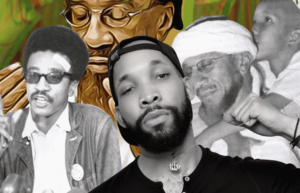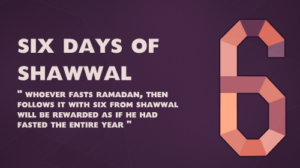I met Mahdi Bray when he was living in the Takoma Park neighborhood of Washington, D.C., in the late 1980s. I was a young activist and a college student at Howard University. I don’t remember exactly how I met him, but I was impressed by his work. I reached out to him regarding some community activities and wanted to meet not only to seek his help but also to learn from him.
I repeatedly called his home phone without getting an answer. The line was often busy, or he simply didn’t pick up because he didn’t have an answering machine. This was before most people had cell phones.

When I finally reached him by phone, we offered to donate an answering machine to support his work. He humbly replied that the work he was doing with incarcerated Muslims required him not to have an answering machine. He explained that when inmates call, they are using up their telephone quota, and if the answering machine picks up, they lose the call. He elaborated that the use of an answering machine raises concerns for law enforcement. The voicemail system could allow inmates to communicate with individuals they are not supposed to contact, potentially facilitating criminal activity. He expressed his commitment to suppressing such issues by preventing inmates from calling people not on their approved list. It was eye-opening for me that day to see how this brother would sacrifice the convenience of an answering machine for the benefit of those who were incarcerated.
After being incarcerated himself, Mahdi founded an organization to assist Muslim inmates in obtaining their civil rights. This organization was based on the work of a Christian organization with a similar name. He called it the National Muslim Prison Project, and from there, he would go on to serve nearly all major Muslim organizations at the national level. Most notably, he was a key organizer of what was then the largest Muslim rally in American Muslim history. This rally, held in front of the White House, advocated for U.S. support to end the genocide in Bosnia.
We used to call him “Demonstrations-R-Us,” a play on “Toys-R-Us.” If anyone wanted to organize a demonstration in Washington, D.C., and needed to know the ins and outs, it was him. He led us in building alliances with organizations like The Answer Coalition, Code Pink, and others at a time when many Muslim organizations were hesitant to engage with the radical left.
Among the organizations he dedicated his life’s work to were, but were not limited to, the Islamic Society of North America, the Islamic Circle of North America, the American Muslim Council, CAIR, MACPACC, MPAC, MAS Freedom Foundation, and the Muslim American Society (MAS). He helped create their civic engagement program, MAS-PACE (Political Action & Civic Engagement).
The last national organization he served with was the American Muslim Alliance (AMA), established by the Hathout Brothers, who continued to support him until his final days as an activist.
Ten years ago, when my middle child, Salima, was studying at Macalester College in Minnesota, a classmate asked her if that was her dad she had seen on television that day. She replied that if it was an African American imam, there was a 50-50 chance it was. The other possible individual was most likely my Brother Mahdi Bray.
In the Muslim media space, he was an active figure. I’m pretty sure C-SPAN had him on speed dial. He represented us well on television and in print, always impeccably dressed for the camera, and taught me how to handle the media.
I remember we were having a rally for a noble cause, but not many people showed up. Mahdi quickly suggested we turn the rally into a march. We marched from Lafayette Park in front of the White House to the Justice Department (if I recall correctly). The novice organizers were concerned about not having a permit to march in Washington, D.C. He masterfully informed the group that if we marched two by two, we wouldn’t need a permit, and by marching double file, the number of protesters would look larger on camera. The march stretched for several blocks in downtown Washington, and the media captured the photos.
I recall attending a White House briefing on an issue that is now lost to history. During the meeting, many national Muslim leaders gathered with the White House Office of Public Engagement. At one point, a member of our delegation was asked to step out of the room. Most of us didn’t think anything of it, but Mahdi noticed something was amiss. He went into the hallway and saw that White House security was removing a Capitol Hill intern and the son of Sami Al-Arian—a tenured academic, prominent speaker, and human rights activist—from the building.
In a flash, Mahdi returned to the room and boldly announced, “Brothers and sisters, this meeting is adjourned!” He instructed everyone to remain in their places and explained what had happened. He urged us to get on our cell phones and call all of our media contacts. At that moment, we were technically staging a “sit-in.” The White House did not attempt to remove us.
Every organization contacted their media outlets to prepare a press release, announcing that we would hold a press conference in front of the White House executive office building an hour after our colleague was removed. Outside the White House, CAIR arranged for a podium on the sidewalk and prepared printed press statements. As we left the steps of the White House, cameras were waiting for us as we articulated our community’s stance regarding the unlawful removal of an individual who was unaware that he was on an unlawful “watch list” and was being profiled by the government.
There are many more dynamic stories I could share about Imam Mahdi. He was a good human being, a leader, a believer, and an activist. I would be remiss not to mention that the work he did for the community took a toll on his family life and personal finances. I know this because, in addition to our professional association, we became like brothers. May Allah reward him and his family for their great sacrifice.
Imam Johari Abdul-Malik has served at the Director of Outreach at the Dar Al Hijrah Islamic Center, the first Muslim Chaplain at Howard University (HU) and is the former Head of the National Association of Muslim Chaplains in Higher Education. The imam has also served as the chair of government relations for the Muslim Alliance in North America (MANA) and was the founding President of the Muslim Advocacy Commission of Washington, DC. He continues to serve on the board of the Interfaith Conference of Metropolitan Washington, one of the nation’s first organizations of its kind with over 11 faith traditions.






One Response
IMAM JOHARI IS A PILLAR TO THE BLACK MUSLIM COMMUNITY AND A HUGE IMPACT ON POSITIVE RELATIONS WITH INCARCERATED INMATES LOOKING TO BETTER THEMSELVES. AS A PROFESSIONAL MUSICIAN, I CAN CONFIRM THAT ONE OF THE BIGGEST INFLUENCES OF MY PROGRESSION IN ISLAM AND MEMORIZATION OF QURANIC VERSES IS DUE TO IMAM JOHARI AS WHENEVER I SAW HIM HE DICTATED A NEW SURAH TO ME… IM TRULY GRATEFUL FOR TIMES SPENT WITH MY FAV IMAM! 🌙✨
ALHAMDULILAH!